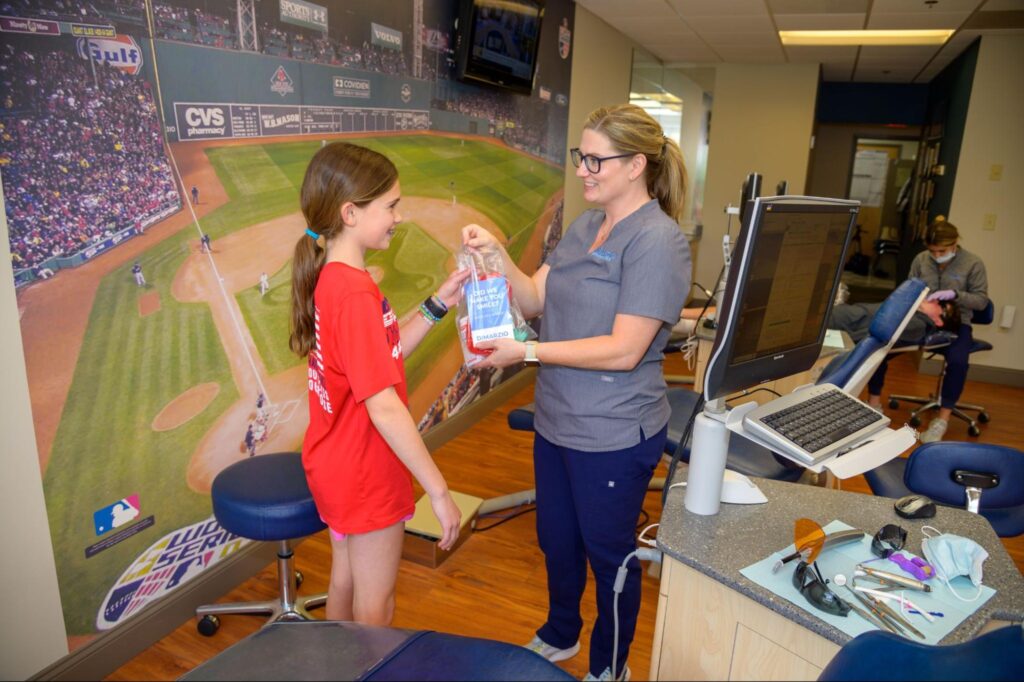Braces can handle a lot throughout the day, but damage still happens now and again. If it does, don’t feel bad—that’s what our team at DiMarzio Orthodontics is here for. We’re going to go over what you should do when braces break.
Fact Or Fiction?
You probably know this already, but there’s a lot of misinformation out there! Dr. DiMarzio and Dr. Marczak want our patients to be provided with accurate information about their braces in case anything goes wrong. So, let’s examine some common areas of confusion:
- Myth 1: Braces Are Self-Repairing
- Reality: This might seem a little silly, but this is a belief some people have! Braces are not capable of fixing themselves if damaged. Once a bracket or wire is broken, it will require our professional attention to restore its function. Ignoring the damage only makes matters worse. Prompt communication is especially important if the issue you’re facing can be classified as an orthodontic emergency.
- Myth 2: Damage Always Extends Treatment Time
- Reality: Not all braces damage will prolong your treatment timeline. The answer is taking action quickly, such as stabilizing loose brackets with orthodontic wax or addressing minor issues promptly. Again—delays occur only when problems are ignored or left unresolved for too long.
- Myth 3: Only Sports Can Cause Major Damage
- Reality: It’s absolutely true that sports are often a problem for patients with braces, assuming they aren’t wearing any protective mouth equipment while playing. But simple everyday habits like chewing on pens or biting your nails can also harm braces. We recommend avoiding behaviors that put excess pressure on your teeth and brackets.
- Myth 4: Braces Damage Means Starting Over
- Reality: While damage can temporarily disrupt your progress, it almost never means we need to start from scratch! Most issues can be addressed without impacting your treatment plan too drastically.
- Myth 5: Wires Breaking Is a Sign of Poor Quality
- Reality: We want to start off by saying our braces are excellent quality—so this is not the reason behind breakage. Braces can break due to various situations, such as excessive pressure or unforeseen trauma. It doesn’t reflect the quality of your braces but rather the need for careful handling and maintenance.

Prevention and Protection
When it’s possible, we want our patients to opt for preventative measures to avoid damage from happening. These behaviors can reduce the risk of damage:
- Stick to Braces-Friendly Foods: Your chosen diet plays a big role in the safety of your braces. You’ll want to eliminate hard, sticky, or crunchy snacks that can stress your brackets and wires. Embrace softer options like yogurt, pasta, and smoothies.
- Wear a Mouthguard: We cannot overemphasize the importance of an orthodontic mouthguard for contact sports. Many student and adult athletes we treat at DiMarzio Orthodontics have mouthguards custom-made to provide top-tier protection.
- Brush and Floss Regularly: Poor oral hygiene can actually affect the stability of your braces. For example, plaque buildup can degrade the adhesive of your brackets. Keep up with your brushing and flossing to avoid this (and bad breath).
- Break Bad Habits: For kids, it can be especially challenging to break idle habits like chewing on pens, fingernails, or ice—but these can all impose damage to various components of braces.
Tools to Help
We always recommend that our patients carry around an orthodontic kit when they’re on the go. This can provide them with tools to help out if short term solutions are needed, whether it’s for maintaining hygiene or handling damage.
- Orthodontic Wax: In many cases of broken brackets or wires, some of our first advice to you will be to use orthodontic wax. It’s perfect to use as a short-term adhesive on loose brackets, or for covering sharp edges on snapped wires. Dental Mirror: In case of damage, having a small mirror is great for being able to take a closer look at problem areas. In addition to a mirror, remember that you probably have a camera on your phone that can help with visibility.
- Travel-Sized Toothbrush and Floss: These are helpful for your routine cleaning of course—but they can also allow you to better discern an area of damage by letting you gently clean around it.
- Small Container: Keeping a small container or plastic bag on you in case a component of your braces comes off fully is very smart. We always prefer you to bring these pieces with you to you repair appointments when you can.

Taking Care of Business
Even if you’re a star student with your braces—cleaning regularly, attending your appointments on time, etc—it doesn’t mean you’re immune to potential damage. If an accident happens, the most important thing is to reach out to our Quincy office right away so we can get you back on track!

